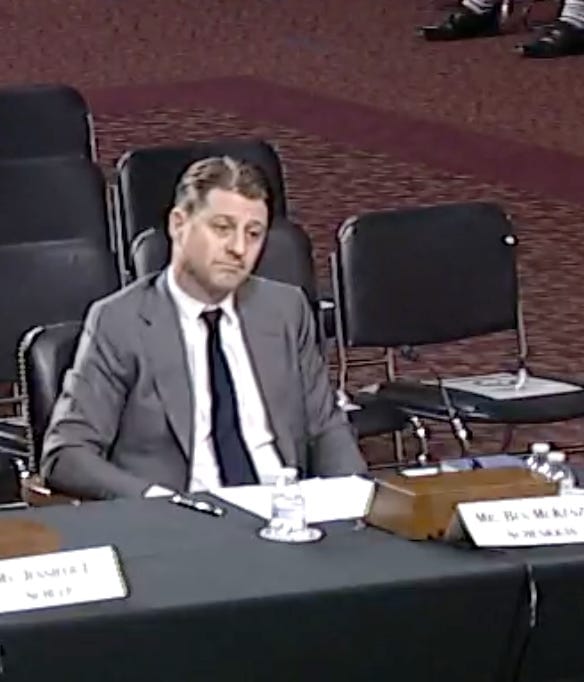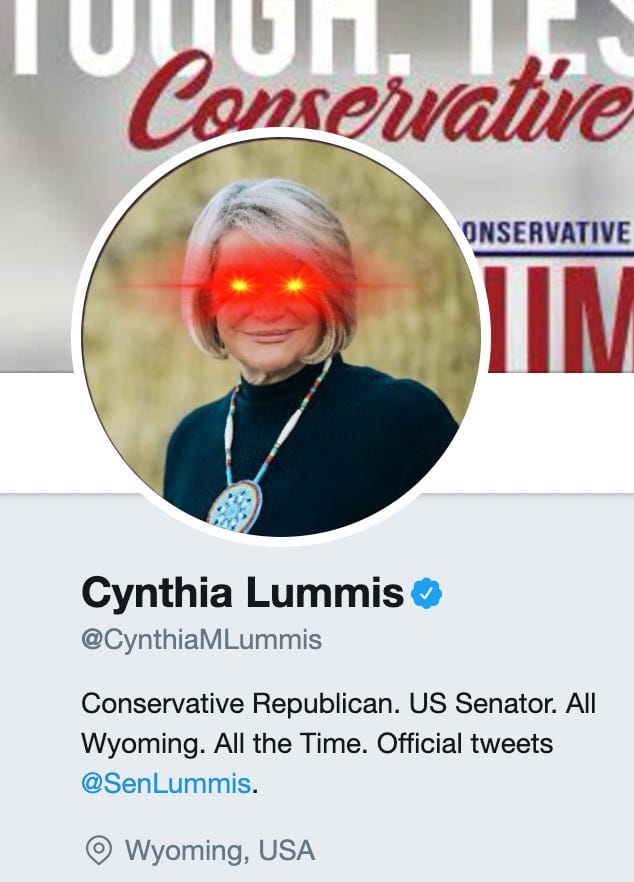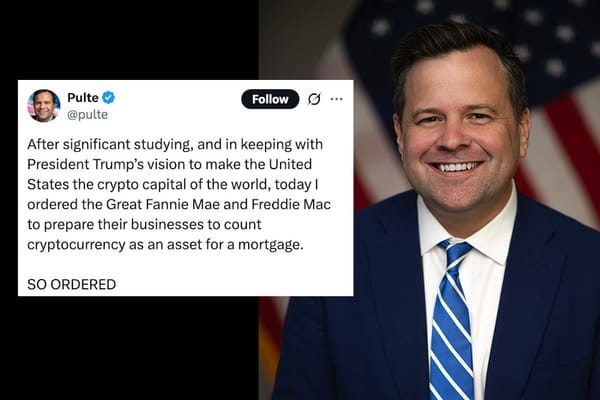FTX hearing: Senate edition
A recap of the Senate hearing on "Crypto Crash: Why the FTX Bubble Burst and the Harm to Consumers", which featured witnesses both advocating for and critical of crypto.

Before I dive into recapping today's hearing, a quick update:
Sam Bankman-Fried's request to be released on $250,000 cash bail (with an ankle monitor) was denied, so he remains incarcerated in The Bahamas. His new digs are apparently not quite as luxurious as the gated penthouse he once called home.
His lawyers have said that he plans to fight extradition.

The Senate hearing
Today was the Senate Banking Committee's hearing, entitled "Crypto Crash: Why the FTX Bubble Burst and the Harm to Consumers". It's also on YouTube, which in my experience is a much more usable than the Senate website's video player.
They invited four witnesses:
Professor Hilary Allen: Allen is a law professor at American University and an expert on financial stability. She testified at a Senate Banking Committee on stablecoins exactly a year ago, and I've cited her likewise excellent testimony from that hearing several times in my various work.
Kevin O'Leary: Yes, the Shark Tank guy. He was paid $15 million by FTX to be their "ambassador", a position he filled vociferously, and he has repeatedly talked up his close relationship with SBF. O'Leary says he lost $9.7 million he'd put in an FTX account (though it's not clear if it was valued at that when he put the money in or if that was a recent figure). O'Leary has recently made statements about how he plans to investigate the FTX collapse himself. He also said on November 15, after it had already become clear that SBF had misappropriated customer funds, that he would invest in SBF again if he asked.
It's worth noting that O'Leary is an investor in the Canadian crypto exchange WonderFi, which heavily markets itself based on the fact that it is regulated in Canada. O'Leary loves the Canadian regulatory regime, and of course loves his investment. He name-drops WonderFi in his testimony, and repeatedly refers to Canadian crypto regulation and how people should be using regulated exchanges.
Jennifer J. Schulp: A director at the Cato Institute, a libertarian think-tank, Schulp has written several articles that give a fairly clear view into her bullish opinions on crypto, with titles like "Don't punish crypto for the sins of SBF's FTX". She's testified several times before in front of House committees, on the various topics of notching, stock trading reforms for Congress, and GameStop and memestocks.
Ben McKenzie Schenkkan: Better known as Ben McKenzie, he's been an outspoken crypto critic, and is working on a book on the subject alongside journalist Jacob Silverman. He's particularly critical of celebrity endorsements of crypto, and wrote an article with Silverman in October 2021 titled "Celebrity Crypto Shilling is a Moral Disaster". Amusingly, that article included a prescient banner image, featuring photos of Lindsay Lohan, Kim Kardashian, and Tom Brady. Kardashian has since been fined $1.25 million by the SEC, and Brady's multiple endorsements were for FTX, the subject of today's Senate hearing. (Lohan, for her part, sold some pricey NFTs and said "Bitcoin is the future", but hasn't been embroiled in any major crypto scandals that I know of).

Each of the four witnesses gave brief statements, and submitted testimony online. O'Leary's written testimony is the same statement that he read at the hearing; Allen, Schulp, and McKenzie each submitted considerably more detailed written testimonies. Thanks to Allen, this newsletter has now been included in Senate testimony! (She cited one of my special editions on the FTX collapse, and also cited my blog post on "Cryptocurrency 'market caps' and notional value").
Senator Brown (D-OH) opened the hearing with a very crypto-critical statement. He recalled back to Facebook's attempts to create the Libra project (which he described as "a shiny new tool Facebook created to reach into Americans' pockets"), and drew comparisons between cryptocurrencies and the risky mortgage bonds and OTC derivatives that led up to the 2008 financial crisis. "Crypto has ushered in a whole new dimension of fraud and threats to national security that support dangerous nation-states, embolden criminals, and finance terrorists," he said, and described "the ability of rogue states, cyber criminals, and terrorists to use crypto for their own malign purposes" as "a feature of the technology".
He was followed up by Senator Toomey (R-PA), a crypto advocate who has investments in $2,000–$30,000 of Grayscale's Bitcoin and Ethereum Trusts. Toomey, predictably, launched into a statement that hit all of the expected talking points post-FTX collapse. This is an issue of fraud, not of crypto. We should crack down on crime but leave crypto room to flourish.
He said, "There is nothing intrinsically good or evil about software; it's about what people do with it." Guns don't kill people, people kill people.
And of course, the "we didn't ban mortgages after the 2008 financial crisis"—his version of yesterday's "we didn't ban railroads" we heard in the House.
Senator Brown began the questions with a round of yes-or-nos directed at all witnesses, asking if the type of "carelessness, misconduct, or worse" at FTX exists at other crypto companies.
Allen: Yes.
O'Leary: Yes, the unregulated crypto firms.
Schulp: Most likely.
McKenzie: It's endemic.
In a later question, McKenzie argued that all cryptocurrencies are securities—something that received pushback from Senator Toomey, who doesn't agree that would apply to Bitcoin.
O'Leary outright blamed FTX's collapse on Changpeng "CZ" Zhao, CEO of Binance—something that SBF has also been trying to suggest.
Then, O'Leary decided to argue that cryptocurrencies are clearly innovative because "1/3 of the class" at MIT have said they want to work in the industry. (He did not cite where he got this number, or when this sentiment was sampled). This was an odd choice, given that SBF's status as an MIT alum has been prominently noted in the news lately, and perhaps does not prime people to see MIT graduates interested in crypto as particularly wise at this very moment.
O'Leary also, of course, spent a while shilling for crypto, which did not seem to be appreciated by all who were forced to listen to it.
Various Senators, including Senator Hagerty (R-TN) and Senator Warner (D-VA), suggested that Binance and/or its executives have close ties to the CCP. One thing to note: CZ really doesn't like it when people suggest Binance has Chinese ties, despite the fact that Binance began in China. CZ has also vehemently pushed back against suggestions that he or the company are tools of the Chinese government, and has accused journalists of xenophobia for suggesting that Binance is a "Chinese company" or asking questions about some of its Chinese employees.
Several Senators expressed concerns over the potential for crypto contagion into traditional finance. Professor Allen urged Senators to "firm up" existing banking regulations. She spoke positively of existing banking regulations which have established firewalls between banks and the crypto industry, and which she credits for helping to severely limit any contagion from FTX into traditional finance, but also expressed concerns over banks beginning to dip their toes into crypto. Senator Tester (D-MT) asked her if, had crypto and traditional finance not been segregated, the U.S. government might have had to bail out crypto like it had to bail out banks in 2008. Allen said yes.
Senator Lummis (R-WY), who holds Bitcoin that was roughly worth $250,000 a year ago (but would now be worth just under $100,000, oof), spent most of her time advertising the crypto industry, and namedropping U.S. exchanges like Kraken, Coinbase, and Bitstamp. When she did ask a question, it was largely to allow her preferred witness (Schulp) to do the advertising for her: "Why do digital assets and distributed ledger technology have the power to make our capital markets safer and more efficient?" Guess the lobbying money's going to good use.

Senator Warren (D-MA) went directly after Lummis, offering a predictably stark contrast to Lummis's shilling. She characterized crypto as a tool for criminals, and asked Allen about the ability for criminals to obscure their activities using crypto. Allen responded with an excellent summary of a point I've tried to make in the past: that it's the worst of both worlds. Well-resourced criminals can obfuscate their tracks using all kinds of strategies, whereas average people who may be less savvy often end up exposing themselves.
In an extremely bizarre few minutes, Warren asked O'Leary whether he believes we should accept weaker anti-money laundering requirements in crypto because of all the promise he sees in the industry. O'Leary said no, but tried to argue with her. Maybe not the wisest move, given the Senator he picked.
"I take issue, Senator, with your concept that it makes it easier to do money laundering. Currencies have been used for drug trafficking since the 60s."
Warren was kind enough not to point out that drug trafficking probably predates that by a few years.
When he tried to argue that the US dollar is used for money laundering too, Warren said yes—and isn't that why the same rules should apply to crypto to traditional finance? "No!" said O'Leary.
When asked by Senator Van Hollen (D-MD) what she would do if she was "queen for a day," Professor Allen replied frankly that she would ban crypto. "But," she said, "if I was someone dealing with multiple constituencies…" she outlined what would be her priorities: strengthen banking law and prevent banks from touching crypto, give the SEC more resources, and pass legislation that classed all crypto assets as securities.
Later, Senator Cortez Masto (D-NV) asked about the recent crypto industry talking point: that this was a failure of centralization, not crypto. "Would defi have helped?" Allen replied that defi is a marketing term, and that despite the name it is not very decentralized. She underscored how decentralization of networks is not the same as economic decentralization, or decentralization of power. Louder for the people in the back.
Senator Sinema (something-AZ) spent a while advertising crypto, talking about its appeal to those skeptical of governments. Then she referred to Professor Allen as "he", suggesting that perhaps that she had only just started paying attention to the hearing. (She subsequently apologized).
The hearing wrapped up with some statements from Toomey and Brown, which were about as pro- and anti-crypto as the opening statements, and that was that.
The full Twitter thread begins here, and Mastodon thread begins here. The thread breaks partway through (again), and is generally difficult to navigate, so I'm going to try to publish a better roll-up as soon as I can.




